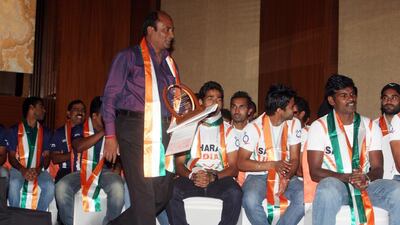Mohammed Shahid, who passed away on July 20 at the age of 56, was just 20 when he won an Olympic gold medal in Moscow (1980). It remains Indian hockey’s last global honour, though it will always be viewed with an asterisk attached. To borrow from athletics, it was an Allan Wells gold, devalued by the absence of the best in the business.
Wells sprinted to 100m glory in 10.25, even as James Sanford (10.02) and Stanley Floyd (10.07), the fastest in the world that year, stayed home because of the US-led boycott of the games. In the hockey competition, India had to contend with just one good side – Spain, who they beat 4-3 in the final.
Pakistan, Netherlands, Australia and West Germany, the top four at the World Cup in 1978, all stayed away. Four years later, the same four nations would make the semifinals when India hosted the competition.
• Eye on India: They love Messi | Duetee Chand a true Olympian
Those were the last good years for Indian hockey. There were damaging defeats – most notably 7-0 to West Germany at the 1978 World Cup, and 7-1 to a Hassan Sardar-inspired Pakistan in the Asian Games final of 1982 – but with Balkishan Singh introducing total-hockey concepts, the side that headed to the 1984 Olympics in Los Angeles were given a decent chance of defending the gold.
Shahid, part of a stellar forward line with Zafar Iqbal, Mervyn Fernandes and Charanjit Singh, was central to India’s game plan, a free spirit with pace, exquisite dribbling skills and an uncanny ability to dodge out of harm’s way. India scored 12 goals in winning their first three games at the Olympics, but a 2-4 reverse against Australia meant that they needed to beat West Germany to seal a semifinal place.
Try as they might, they couldn’t breach the German defence, and a 0-0 draw saw them exit on goal difference. Apart from Sydney in 2000, when only a 69th minute Polish goal denied India a semifinal place, it’s the closest they’ve come to breaching hockey’s biggest citadel.
Shahid was one of the few Indian players who didn’t look a complete misfit on AstroTurf, which demanded far greater fitness levels, especially with the new wave emphasising strength as much as skill. Pakistan coped with the transition from natural grass far better, and it was indicative of how redundant the old Indian methods had become that Shahid’s final Olympic appearance, in a 3-0 defeat to Great Britain (1988), was as a substitute.
In a poignant tribute in The Indian Express, Sandeep Dwivedi wrote: “Much before the world discovered virtual reality games, Shahid dragged a generation of fans into the television, giving them a digital 3-D experience. Shahid demanded your attention, got you engrossed, and left you exhausted after watching a hockey game. For those who came in late, the young people, it was ‘Ppokemon Go’ without moving around, and without looking stupid.”
He spawned a generation of imitators. Sadly, without his full bouquet of skills, most of them did little more than dribble their way into blind alleys and get dispossessed. By 2008, Indian hockey was in such dire straits that the team didn’t even qualify for the Olympics, but as ever, denial based on nostalgia was the name of the game.
Shahid himself was guilty of the hidebound thinking that has stymied Indian hockey over the past three decades. “The world has learnt hockey from Indians and from my point of view this is totally absurd that foreigners can teach us the game of hockey better,” he wrote in a column for Khel Today in April. “Why should we learn from them?”
But it’s not for such remarks that he will be remembered. At his best, he was perhaps the last link to Indian hockey’s golden age, when artistry and trickery were high currency, and before new coaching methods and greater athleticism made them yesterday’s men.
Follow us on Twitter @NatSportUAE
Like us on Facebook at facebook.com/TheNationalSport

